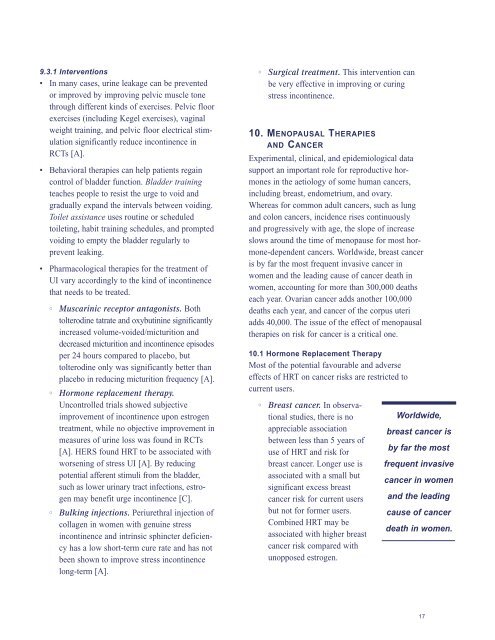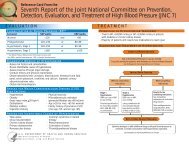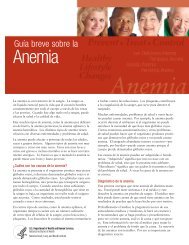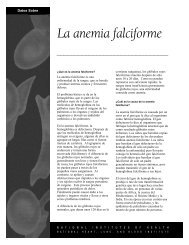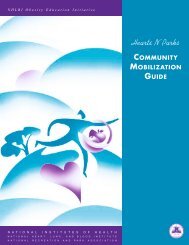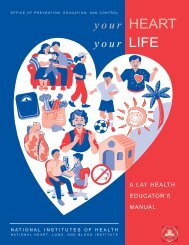WOMEN 'S HEALTH AND MENOPAUSE : - National Heart, Lung ...
WOMEN 'S HEALTH AND MENOPAUSE : - National Heart, Lung ...
WOMEN 'S HEALTH AND MENOPAUSE : - National Heart, Lung ...
You also want an ePaper? Increase the reach of your titles
YUMPU automatically turns print PDFs into web optimized ePapers that Google loves.
9.3.1 Interventions<br />
• In many cases, urine leakage can be prevented<br />
or improved by improving pelvic muscle tone<br />
through different kinds of exercises. Pelvic floor<br />
exercises (including Kegel exercises), vaginal<br />
weight training, and pelvic floor electrical stimulation<br />
significantly reduce incontinence in<br />
RCTs [A].<br />
• Behavioral therapies can help patients regain<br />
control of bladder function. Bladder training<br />
teaches people to resist the urge to void and<br />
gradually expand the intervals between voiding.<br />
Toilet assistance uses routine or scheduled<br />
toileting, habit training schedules, and prompted<br />
voiding to empty the bladder regularly to<br />
prevent leaking.<br />
• Pharmacological therapies for the treatment of<br />
UI vary accordingly to the kind of incontinence<br />
that needs to be treated.<br />
• Muscarinic receptor antagonists. Both<br />
tolterodine tatrate and oxybutinine significantly<br />
increased volume-voided/micturition and<br />
decreased micturition and incontinence episodes<br />
per 24 hours compared to placebo, but<br />
tolterodine only was significantly better than<br />
placebo in reducing micturition frequency [A].<br />
• Hormone replacement therapy.<br />
Uncontrolled trials showed subjective<br />
improvement of incontinence upon estrogen<br />
treatment, while no objective improvement in<br />
measures of urine loss was found in RCTs<br />
[A]. HERS found HRT to be associated with<br />
worsening of stress UI [A]. By reducing<br />
potential afferent stimuli from the bladder,<br />
such as lower urinary tract infections, estrogen<br />
may benefit urge incontinence [C].<br />
• Bulking injections. Periurethral injection of<br />
collagen in women with genuine stress<br />
incontinence and intrinsic sphincter deficiency<br />
has a low short-term cure rate and has not<br />
been shown to improve stress incontinence<br />
long-term [A].<br />
• Surgical treatment. This intervention can<br />
be very effective in improving or curing<br />
stress incontinence.<br />
10. MENOPAUSAL THERAPIES<br />
<strong>AND</strong> CANCER<br />
Experimental, clinical, and epidemiological data<br />
support an important role for reproductive hormones<br />
in the aetiology of some human cancers,<br />
including breast, endometrium, and ovary.<br />
Whereas for common adult cancers, such as lung<br />
and colon cancers, incidence rises continuously<br />
and progressively with age, the slope of increase<br />
slows around the time of menopause for most hormone-dependent<br />
cancers. Worldwide, breast cancer<br />
is by far the most frequent invasive cancer in<br />
women and the leading cause of cancer death in<br />
women, accounting for more than 300,000 deaths<br />
each year. Ovarian cancer adds another 100,000<br />
deaths each year, and cancer of the corpus uteri<br />
adds 40,000. The issue of the effect of menopausal<br />
therapies on risk for cancer is a critical one.<br />
10.1 Hormone Replacement Therapy<br />
Most of the potential favourable and adverse<br />
effects of HRT on cancer risks are restricted to<br />
current users.<br />
• Breast cancer. In observational<br />
studies, there is no<br />
appreciable association<br />
between less than 5 years of<br />
use of HRT and risk for<br />
breast cancer. Longer use is<br />
associated with a small but<br />
significant excess breast<br />
cancer risk for current users<br />
but not for former users.<br />
Combined HRT may be<br />
associated with higher breast<br />
cancer risk compared with<br />
unopposed estrogen.<br />
Worldwide,<br />
breast cancer is<br />
by far the most<br />
frequent invasive<br />
cancer in women<br />
and the leading<br />
cause of cancer<br />
death in women.<br />
17


